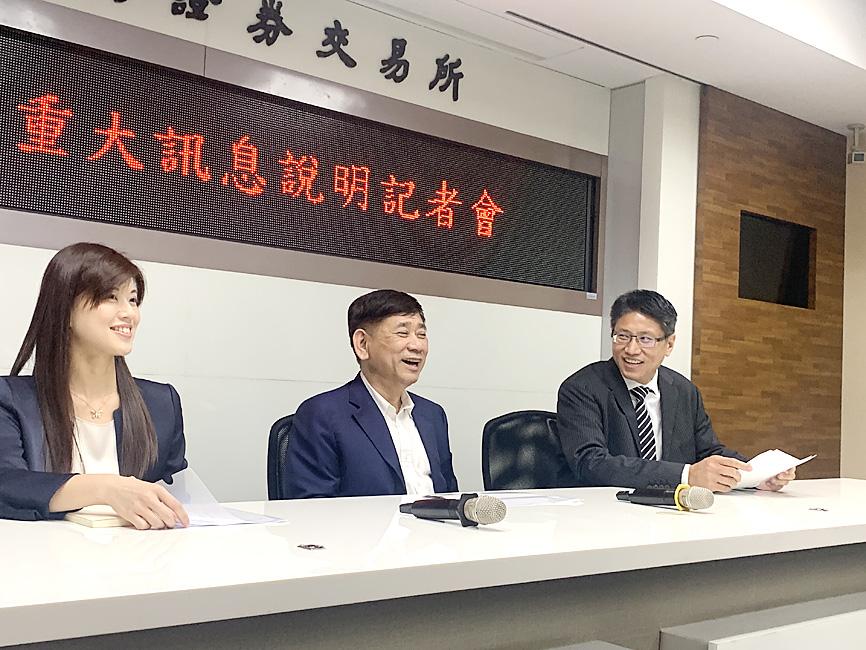Apple Inc supplier Catcher Technology Co Ltd (可成科技) is to sell two of its smartphone metal chassis plants to Lens Technology Co Ltd (藍思科技), a Chinese handset-cover glass maker, company officials told a news conference yesterday.
The company’s board of directors approved the sale of its 100 percent stakes in Topo Technology (Taizhou) Co Ltd (泰州可勝科技) and Meeca Technology (Taizhou) Co Ltd (泰州可利科技) to Lens Technology in a US$1.43 billion all-cash deal that is expected to close by the end of this year, pending regulatory approvals, they said.
Catcher spokesman James Wu (巫俊毅) said the time had come for the firm to partially transition out of its long-standing smartphone chassis business.

Photo: Chang Hui-wen, Taipei Times
“Changing international trade relations, customer strategy change and increased price competition have all accelerated the trend toward vertical integration for the whole supply chain,” Wu said.
The two plants to be sold accounted for 40 percent of Catcher’s revenue last year, he said.
After the sale, Catcher would have two manufacturing operations, with one in Tainan and the other in Suqian, China.
“We still have tremendous capacity and we will be putting our focus on products such as notebook and tablet casings, 5G heat-diffusion components and auto components, where there are opportunities for growth,” Wu said.
Unlike a recent deal in which iPhone manufacturer Wistron Corp (緯創) sold two Chinese divisions to Chinese IT manufacturer Luxshare Group (立訊集團), there would be no mutual investment between Catcher and Lens Technology, he said.
Instead, the money would potentially be used for acquisitions and to improve the firm’s remaining manufacturing capacity, he said.
When asked about the rise of a Chinese vertically integrated supply chain that is expected to challenge Taiwanese manufacturers’ dominance in the iPhone assembly business, Catcher chairman Allen Hung (洪水樹) said that “it will take a while.”
“It is not that easy,” Hung said. “They talk about Taiwanese companies like we are plastic, but there are complicated management and processes issues that would be hard to replicate.”
Catcher is “divesting to invest” and looking for opportunities domestically and abroad, although there are as of yet no plans to invest in India or Southeast Asia, Hung said.
“Short-term revenue will take a hit, but this is what it takes to stay ahead of the curve,” he said. “This is about the next 10 to 20 years.”
The sale of the plants was not related to a COVID-19-related slowdown in demand, Wu said, citing revenue growth in the first two quarters.
“Our company did very well, despite the pandemic,” he said. “It is not a factor in our decisionmaking.”
The company last week reported that revenue last quarter rose 40 percent year-on-year to NT$22.54 billion (US$763.60 million), and revenue for the first half grew 26 percent to NT$40.15 billion from a year earlier.
However, net profit for the second quarter was NT$2.77 billion, flat from NT$2.73 billion in the second quarter of last year.
Net profit for the first half of this year was NT$6.69 billion, up 51 percent from NT$4.44 billion a year earlier.

SEMICONDUCTORS: The German laser and plasma generator company will expand its local services as its specialized offerings support Taiwan’s semiconductor industries Trumpf SE + Co KG, a global leader in supplying laser technology and plasma generators used in chip production, is expanding its investments in Taiwan in an effort to deeply integrate into the global semiconductor supply chain in the pursuit of growth. The company, headquartered in Ditzingen, Germany, has invested significantly in a newly inaugurated regional technical center for plasma generators in Taoyuan, its latest expansion in Taiwan after being engaged in various industries for more than 25 years. The center, the first of its kind Trumpf built outside Germany, aims to serve customers from Taiwan, Japan, Southeast Asia and South Korea,

Gasoline and diesel prices at domestic fuel stations are to fall NT$0.2 per liter this week, down for a second consecutive week, CPC Corp, Taiwan (台灣中油) and Formosa Petrochemical Corp (台塑石化) announced yesterday. Effective today, gasoline prices at CPC and Formosa stations are to drop to NT$26.4, NT$27.9 and NT$29.9 per liter for 92, 95 and 98-octane unleaded gasoline respectively, the companies said in separate statements. The price of premium diesel is to fall to NT$24.8 per liter at CPC stations and NT$24.6 at Formosa pumps, they said. The price adjustments came even as international crude oil prices rose last week, as traders

Taiwan Semiconductor Manufacturing Co (TSMC, 台積電), which supplies advanced chips to Nvidia Corp and Apple Inc, yesterday reported NT$1.046 trillion (US$33.1 billion) in revenue for last quarter, driven by constantly strong demand for artificial intelligence (AI) chips, falling in the upper end of its forecast. Based on TSMC’s financial guidance, revenue would expand about 22 percent sequentially to the range from US$32.2 billion to US$33.4 billion during the final quarter of 2024, it told investors in October last year. Last year in total, revenue jumped 31.61 percent to NT$3.81 trillion, compared with NT$2.89 trillion generated in the year before, according to

SIZE MATTERS: TSMC started phasing out 8-inch wafer production last year, while Samsung is more aggressively retiring 8-inch capacity, TrendForce said Chipmakers are expected to raise prices of 8-inch wafers by up to 20 percent this year on concern over supply constraints as major contract chipmakers Taiwan Semiconductor Manufacturing Co (TSMC, 台積電) and Samsung Electronics Co gradually retire less advanced wafer capacity, TrendForce Corp (集邦科技) said yesterday. It is the first significant across-the-board price hike since a global semiconductor correction in 2023, the Taipei-based market researcher said in a report. Global 8-inch wafer capacity slid 0.3 percent year-on-year last year, although 8-inch wafer prices still hovered at relatively stable levels throughout the year, TrendForce said. The downward trend is expected to continue this year,